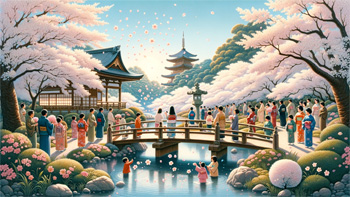 Vernal Equinox Day in Japan
Vernal Equinox Day in Japan


Vernal Equinox Day in Japan, known as 'Shunbun no Hi', is a significant day that marks the arrival of spring. Celebrated around March 20th or 21st each year, this day is not just a signal of the changing seasons but also holds deep cultural and spiritual significance. In Japan, where the changing of seasons is closely intertwined with cultural practices, Vernal Equinox Day is a time for both joyous celebration and solemn reflection. This article delves into the history, customs, and modern-day observance of Vernal Equinox Day, offering a window into how this day is cherished in Japan.
Historically, Vernal Equinox Day has its roots in Shinto beliefs, Japan's indigenous spirituality. The day was traditionally a time to celebrate nature, life, and new beginnings, as it coincides with the awakening of the earth after the cold winter. Over the years, the day has evolved to incorporate Buddhist traditions as well, making it a unique blend of Japan's major spiritual and cultural practices.
Celebrating Nature and Family
One of the central aspects of Vernal Equinox Day is the celebration of nature. With cherry blossoms beginning to bloom and the countryside turning lush and green, people in Japan take the time to appreciate the beauty of nature. Families often visit parks, gardens, and natural sites to enjoy the scenery and partake in 'hanami', the traditional custom of flower viewing, especially cherry blossoms.
This day is also a time for family gatherings. Many Japanese travel to their hometowns to spend time with their families, similar to the Obon festival in summer. These gatherings are a way to reconnect with loved ones and enjoy the seasonal changes together.
Spiritual Practices and Ancestral Remembrance
Vernal Equinox Day also has a spiritual dimension. It is a time for remembering and honoring ancestors, a practice known as 'Higan'. During Higan, people visit family graves to clean them and offer flowers and prayers. This custom is rooted in Buddhist teachings, which emphasize the impermanence of life and the importance of moving beyond material concerns.
Many temples hold special services during this period. These services often include readings of Buddhist sutras and lectures on spiritual teachings. The focus is on achieving a balance between the physical and spiritual worlds and reflecting on one's life and actions.
Modern Observations and Activities
In modern times, Vernal Equinox Day has taken on additional dimensions. While traditional practices continue, the day is also an opportunity for various outdoor activities and cultural events. In cities, there may be art exhibitions, concerts, and food festivals that celebrate the coming of spring. These events often blend traditional Japanese culture with modern entertainment, appealing to people of all ages.
Schools and educational institutions use this day to teach students about environmental conservation and the importance of nature. Activities like tree planting and nature walks are common, fostering a sense of responsibility towards the environment among the younger generation.
Vernal Equinox Day in Japan beautifully encapsulates the harmonious relationship between nature, culture, and spirituality. It's a day that celebrates the joy of spring, the value of family and community, and the depth of spiritual reflection. As Japan continues to modernize, this day remains a poignant reminder of the country's deep connection to nature and its cyclical patterns, and the enduring relevance of its cultural traditions.